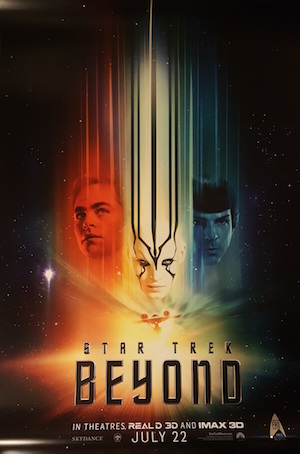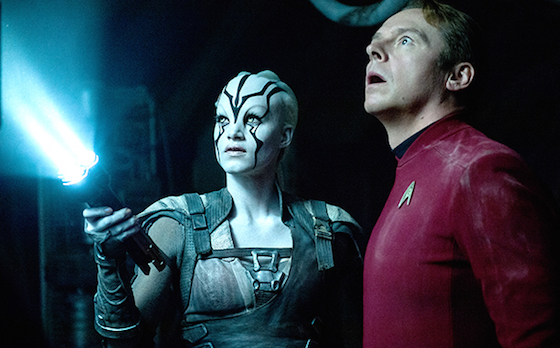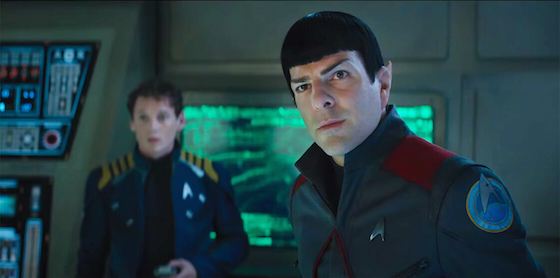 [Rating: Minor Rock Fist Down]
[Rating: Minor Rock Fist Down]
When director J.J. Abrams was tasked with rebooting Star Trek in 2009 following a string of critically-maligned Trek films, he did so in a way that cleverly paid respect to the Star Trek legacy while infusing the franchise with energy, a charismatic young cast, and a playful sense of self-awareness. The film’s ingenious creation of an alternate timeline (dubbed the Kelvin Timeline by fans, named for the ship that Captain James T. Kirk’s father commanded) allowed subsequent movies to explore new adventures and characters without entirely dismissing everything that had occurred in previous iterations of Star Trek.
It was an exhilarating high wire act watching Abrams balance the movie’s appeal to long-time Trekkers while managing to attract a new crowd with limited familiarity to the Star Trek universe (myself included). As a new fan I couldn’t tell the difference between a tribble and a klingon, but I recognized the immediate chemistry between standouts Chris Pine and Zachary Quinto in the roles of Captain James T. Kirk and Spock, and I enjoyed the masterful, witty action of J.J. Abrams’ direction, lens flares and all.
If Abrams’ follow-up Star Trek Into Darkness favored big-budget action and a grittier tone over the intelligence and optimism that has long been the guiding principle of Star Trek (indeed, Into Darkness was ranked as the worst of the Star Trek franchise at the 2013 Las Vegas Star Trek Convention), it was still an excellently constructed adventure movie that further developed the fascinating relationship between Kirk and Spock. And Into Darkness ended on a promising note as the crew began a 5-year mission to explore the universe aboard the USS Enterprise.
Star Trek Beyond, the latest entry in the rebooted timeline, begins in medias res with Kirk presenting a gift of peace to a hostile alien race. The back and forth banter between arrogant Kirk and the grouchy alien leader elicits a few chuckles (the aliens are revealed to be little more than ferocious chihuahuas), but the cartoonish CGI and slapstick humor are early indicators that Star Trek Beyond will be moving into sillier territory than its predecessors.
Once Kirk is beamed back to the Enterprise, it’s revealed that he and his crew of Spock, Dr. McCoy (Karl Urban), Sulu (John Cho), Scotty (Simon Pegg), Uhura (Zoe Saldana), Chekov (the late Anton Yelchin) and countless unnamed Federation members are three years into their five year voyage. The attitude of the crew aboard the ship has dissolved from a sense of purpose into tedium as they travel aimlessly from one planet to another on diplomatic and exploratory missions. Kirk especially has doubts about his role as captain on this ship of monotony; feeling burnt out, he’s put in an application for the role of Vice Admiral on a new Federation starbase called Yorktown (a gravity-defying space station that looks like the city warping dreams of Inception set on Elysium).
Much has changed behind the scenes as well: gone from Star Trek Beyond is J.J. Abrams (now a producer), bowing out to put his reboot talents to use on Star Wars: The Force Awakens. In his place is director Justin Lin, best known for his work on movies in the adrenaline-fueled Fast & Furious franchise. Stepping in as writers are Simon Pegg (doing double duty) and Doug Jung replacing Roberto Orci and Alex Kurtzman of the previous two films. For fans of Star Trek hoping for the franchise to return to its more intellectual roots, the thought of the director of Fast & Furious 6 taking the reigns on this latest voyage may not be reassuring. And by the time Chris Pine launches himself off a motorcycle to catch someone mid-air before being beamed back to the Enterprise, viewers will have realized that Star Trek Beyond is easily the most bone-headed, silly, and action-packed of the rebooted franchise.
The movie centers on Kirk & Co. attempting to stop villainous Krall (Idris Elba, who along with Oscar Isaac of X-Men: Apocalypse is one of two excellent actors to have had their talents and charisma buried under piles of makeup as villains this summer) from destroying Yorktown with an all-powerful ancient bioweapon. It’s a simple enough plot with plenty of excuses for director Lin to put the crew through scenes of predictably numbing mass destruction. Early on, the Enterprise is violently ripped apart by a swarm of generic CGI creatures, crash lands on a planet leaving a trail of destruction, and eventually explodes — familiar images to anyone who has seen Transformers, a Marvel movie, or hell, even the last two Star Trek films.
Even the comedic moments lack the punch of previous Star Trek films, surprising given Simon Pegg’s involvement in the script. Nothing here comes close to the wit of Pegg’s Shaun of the Dead or Hot Fuzz, with most of the movie’s one-liners falling uncomfortably flat. Pegg and Jung have scripted a predictable and ultimately rather dull sci-fi film that does little to push the boundaries of the summer blockbuster template.
A critical flaw is the script’s decision to keep Kirk and Spock separated for long stretches of the film. The duo’s conflicted relationship has been the fulcrum on which the previous two movies balanced, and the actors’ chemistry is sorely missed. Here Spock is paired with Dr. McCoy (Karl Urban, hamming it up with unfunny and snarky dialogue), while Kirk teams with Chekov and new ally Jaylah, a technologically-savvy alien warrior (and a bright spot of the movie). Other characters don’t register at all (Uhura and Sulu have barely any speaking lines) or are saddled with filler lines like “I’m converting the VHF frequency to sweep phase,” the kind of meaningless tech babble Tony Shalhoub parodied to such great effect as Tech Sgt. Chen in Galaxy Quest (“We might be able to get there if we reconfigure the solar matrix for endothermic propulsion…What do you think?”).
The movie climaxes in an incoherent explosion of digital effects when the crew of the Enterprise develops a plan to destroy the thousands of enemy drones headed toward Yorktown. By reversing the enemy’s radio signals (or something) and blasting Beastie Boy’s “Sabotage” at high volume (an unnecessary callback to the first Abrams Star Trek), the drones will be so disoriented by the loud noises that they’ll be destroyed in the confusion. It’s ironic how much the scene captures the experience of watching this movie.
Justin Lin’s Star Trek Beyond is fast and furious yet never quite goes anywhere. For the first time in this rebooted franchise, Star Trek feels like a ship not sure of its destination.









Comments on this entry are closed.